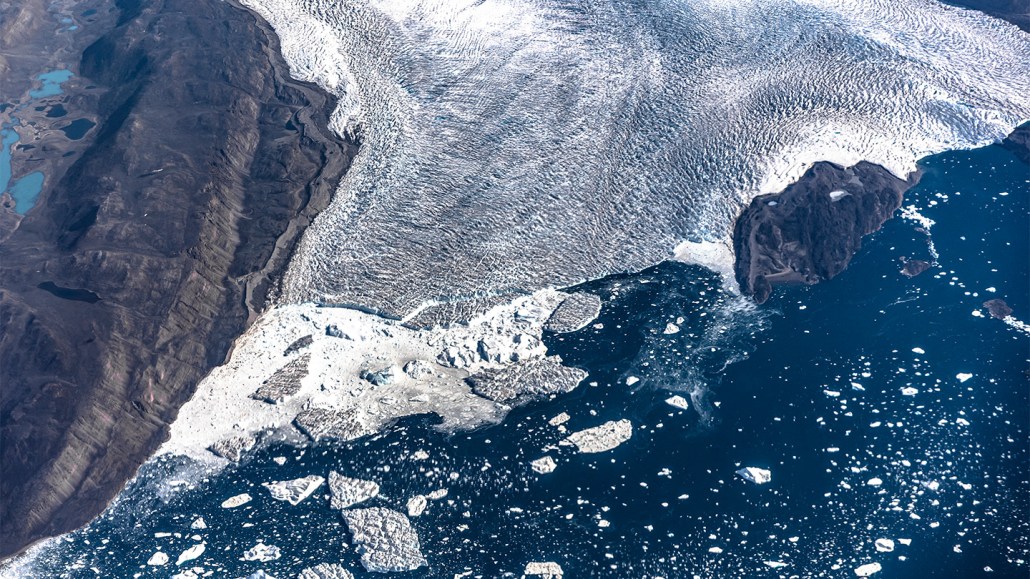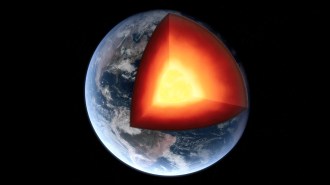
The rapidly accelerating melting of Earth’s polar ice sheets — including ice atop Greenland (shown here) — is slowing the planet’s spin, which affects global timekeeping.
KEREM YUCEL/AFP via Getty Images
Climate change may be making it harder to know exactly what time it is.
The rapid melting of the ice sheets atop Greenland and Antarctica, as measured by satellite-based gravitational measurements, is shifting more mass toward Earth’s waistline. And that extra bulge is slowing the planet’s rotation, geophysicist Duncan Agnew reports online March 27 in Nature. That climate change–driven mass shift is throwing a new wrench into international timekeeping standards.
The internationally agreed-upon coordinated universal time, or UTC, is set by atomic clocks, but that time is regularly adjusted to match Earth’s actual spin. Earth’s rotation isn’t always smooth sailing — the speed of the planet’s spin changes depending on a variety of factors, including gravitational drag from the sun and the moon, changes to the rotation speed of Earth’s core, friction between ocean waters and the seafloor, and shifts in the planet’s distribution of mass around its surface. Even earthquakes can affect the spin: The magnitude 9.1 earthquake in Indonesia in 2004, for example, altered the land surface in such a way that it caused Earth to rotate a tiny bit faster, says Agnew, of the Scripps Institution of Oceanography in La Jolla, Calif.
But the impact of that quake is much smaller than that of the ice sheets’ melting — a point that Agnew says he finds particularly startling. Humankind “has done something that affects, measurably, the rotation rate of the entire Earth.”
The need for occasional tweaks to the synchronization of atomic clocks and Earth’s rotation gave birth in 1972 to the “leap second,” an extra tick that international timekeepers agreed to add to UTC as needed (SN: 1/19/24). Timekeepers have added 27 leap seconds to the clock since the idea was introduced.
Still, metrologists — measurement scientists — aren’t overly fond of this system. For one thing, it doesn’t happen on a regular schedule, but only whenever it seems to be needed. And financial markets and satellite navigation systems, which rely on precise timing, each have their own methodologies for incorporating a leap second. Those inconsistencies can, counterproductively, make it more challenging to have a universal time. So in 2022, an international consortium of metrologists voted to do away with leap seconds in favor of adding larger chunks of time, perhaps a minute, less frequently. The group resolved to settle those details at its next meeting, in 2026.
That may not come a second too soon. The slightly slower rotation has actually delayed the need for timekeeping adjustments by a few years, Agnew says — in fact, as a result of this change, the last time a leap second was required to be inserted was in 2016. At the moment, in fact, Earth’s rotation and atomic clocks are nearly in sync.
But that’s just a brief respite, Agnew’s calculations show. The biggest changes to Earth’s rotation right now are coming from its heart: slowing rotation of Earth’s core is actually speeding up the spin of the outer layers (SN: 1/23/23). That slowdown will ultimately mean that timekeepers, under the current system, must begin removing leap seconds from the UTC, rather than inserting them, to keep things in sync.
That shift in strategy might have begun as soon as in 2026. But the study suggests that, thanks to climate change, global timekeepers now have an extra two or three years before they need to adjust, notes geophysicist Jerry Mitrovica of Harvard University. But no realistic projections of future melting can forestall the inevitable beyond 2030, Mitrovica adds: One way or another, the world is going to have to start losing time — or international timekeeping guidelines will need to change.







